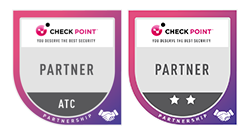Type
Virtual
Classroom ILT
Skill Level
Available dates
Learning Path
Virtual
Duration
1 Day

TYPE
Virtual
Classroom ILT
LEARNING PATH
SKILL LEVEL
DURATION
AVAILABLE DATES
Choose date
R14 900,00
Price excluding VAT
Introduction
The Check Point Certified Security Engineering course is an advanced 3-day course that teaches an understanding of upgrading and advanced configuration of Check Point software blades, installing and managing VPNs (Virtual Private Network) (on both internal and external networks), gaining the maximum security from Security Gateways, and resolving Gateway performance issues. Learn How To: – Backup your Security Gateway and Management Server – Build, test and troubleshoot a clustered Security Gateway – Upgrade and troubleshoot a Management Server – Configure and maintain security acceleration solutions – Manage, test and optimize corporate VPN (Virtual Private Network) tunnels. This course validates your understanding and skills necessary to configure and optimally manage Check Point Next Generation Firewalls.
Audience profile
This course is intended primarily for:
- System Administrators
- Support Analysts
- Security Managers
- Network Engineers
- Technical professionals who support, install deploy or administer advanced deployment configurations of Check Point Software Product
Pre-requisites
In addition to their professional experience, students who attend this training should already have the following technical knowledge:
- General Knowledge of TCP/IP
- Security Administration course or CCSA certification (R81 not R77)
- Working knowledge of Windows and/or UNIX, Network technology, the internet and TCP/IP
Course objectives
After completing this course, students will be able to:
- Identify basic interfaces used to manage the Check Point environment
- Identify the types of technologies that Check Point supports for automation
- Explain the purpose of the Check Management High Availability (HA) deployment
- Identify the workflow followed to deploy a Primary and solution Secondary servers
- Explain the basic concepts of Clustering and ClusterXL, including protocols, synchronization, and connection stickiness
- Identify how to exclude services from synchronizing or delaying synchronization
- Explain the policy installation flow
- Explain the purpose of dynamic objects, updatable objects, and network feeds
- Understand how to manage user access for internal and external Users
- Describe the Identity Awareness components and configurations
- Describe different Check Point Threat Prevention solutions
- Articulate how the Intrusion Prevention System is configured
- Obtain knowledge about Check Point’s IoT (Internet of Things) Protect
- Explain the purpose of Domain-based VPNs
- Describe situations where externally managed certificate authentication is used
- Describe how client security can be provided by Remote Access
- Discuss the Mobile Access Software Blade
- Explain how to determine if the configuration is compliant with the best practices
- Define performance tuning solutions and basic configuration workflow
- Identify supported upgrade and migration methods and procedures for Security Management Servers and dedicated Log and SmartEvent Servers
- Identify supported upgrade methods and procedures for Security Gateways
Course content
| Module 1: Advanced Deployments | |
| Module 2: Management High Availability | |
| Module 3: Advanced Gateway Deployments | |
| Module 4: Advanced Policy Configuration | |
| Module 5: Advanced User Access Management | |
| Module 6: Custom Threat Protection | |
| Module 7: Advanced Site-to-Site VPN | |
| Module 8: Remote Access VPN | |
| Module 9: Mobile Access VPN | |
| Module 10: Advanced Security Monitoring | |
| Module 11: Performance Testing | |
| Module 12: Advanced Security Maintenance | |
|
Exercises:
|
|
|
|
|
|
|
Configure a Site-to-Site VPN with an Interoperable Device |
|
|
|
|
|
|
|
|
|
|
|
|
Associated Certifications & Exam
This course helps prepare for CCSE R81 #156-315.81.20 certification exam. Students must have a valid CCSA certification before challenging the CCSE exam.
Students should have at least 6 months to 1 year experience with Check Point products is recommended and must have passed the CCSA exam before challenging the exam.
A Check Point User Center or PartnerMAP account is required to receive benefits for Check Point certifications. The Check Point Account Services team will be able to verify student information.
Exam covers the following topics:
- Check Point Technology Overview
- Deployment Platforms and Security Policies
- Monitoring Traffic and Connections
- Network Address Translations
- User Management and Authentication
- Using SmartUpdate
- Implementing Identity Awareness
- Configuring VPN tunnels
- Resolving security administration issues
| Exam Details | CCSE |
| Exam Title | Check Point Certified Security Expert |
| Number of Questions/Practical Challenges | 90 Questions |
| Test Duration | 1 Hour, 30 Minutes |
| Test Format | Multiple-choice Questions |
| Test Delivery | Pearson Vue exam centre |
| Availability | Remote Proctoring Services |
| Exam Prefix | #156-315.20 |
On successful completion of this course students will receive a Torque IT attendance certificate.

Check Point Overview
Torque IT and Check Point are dedicated to providing customers with training, certification and technology solutions that offer uncompromised protection against security threats whilst reducing complexity and lowering total cost of ownership.
Check Point works only with the best partners in the security industry and Torque IT has stepped up to the challenge of becoming Africa’s Check Point Authorised Training Centre (ATC) of choice for best-in-class Check Point enablement and certification solutions.
We offer off-the-shelf Check Point Training and Certification Solutions as well as customized deliveries that are tailored to your unique requirements.
Torque IT has specialized in providing vendor authorized technology training, enablement and certification solutions for 21 years and our vast experience positions us uniquely to offer you world class service at any of our national training facilities, in South Africa, or onsite across Africa.

